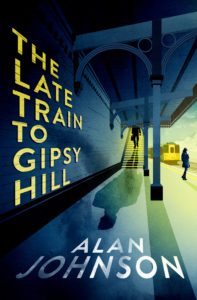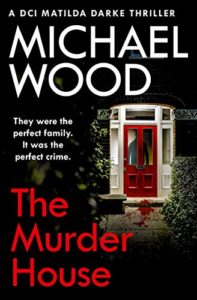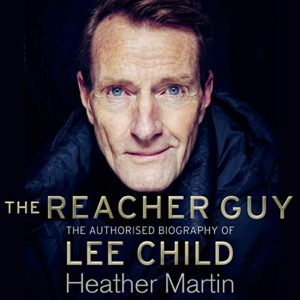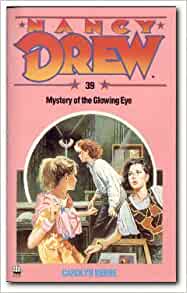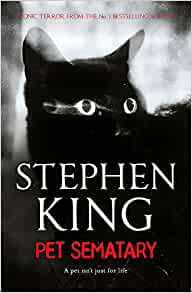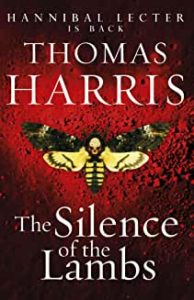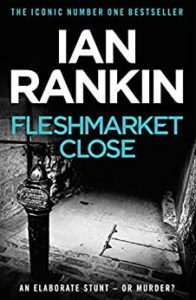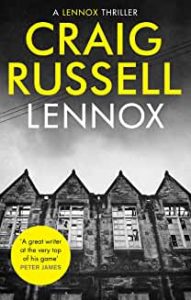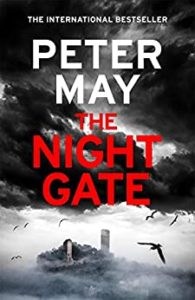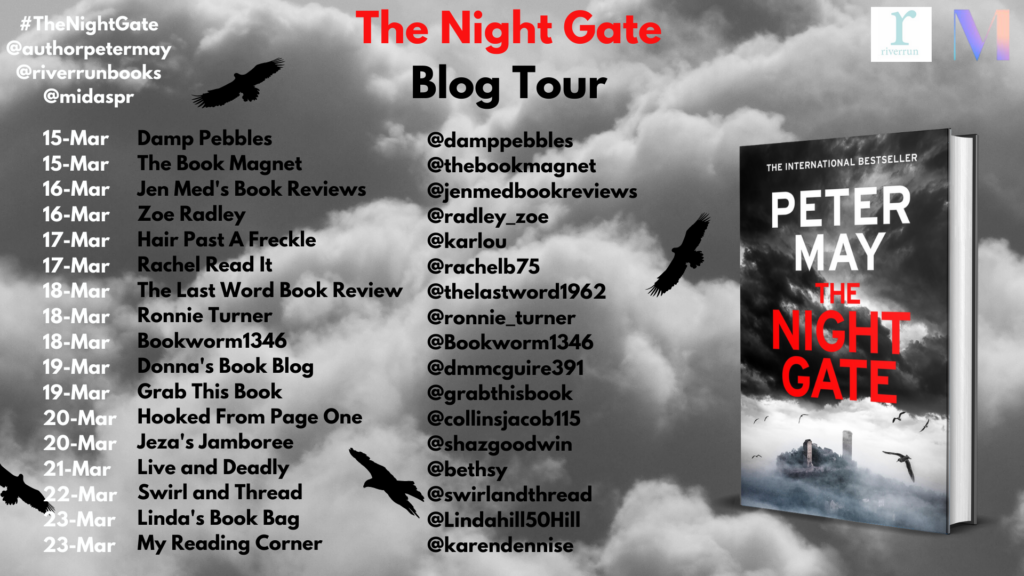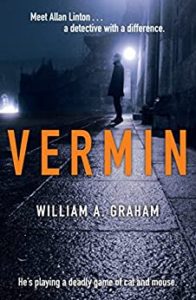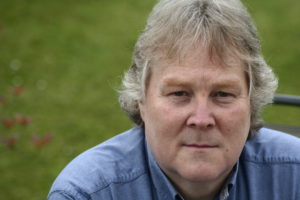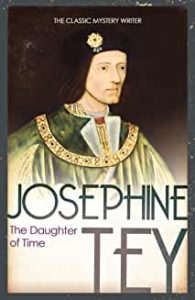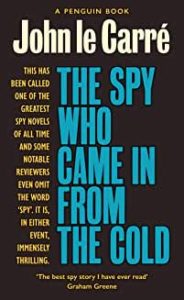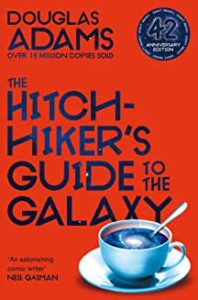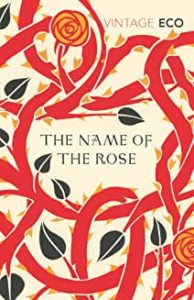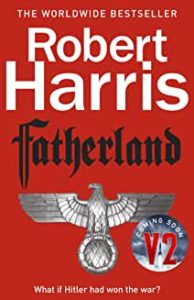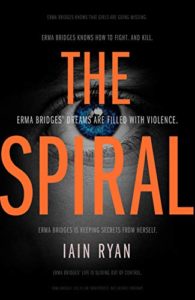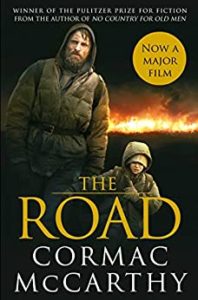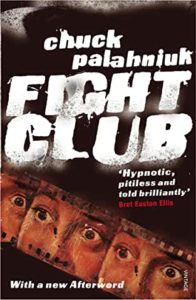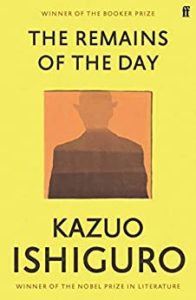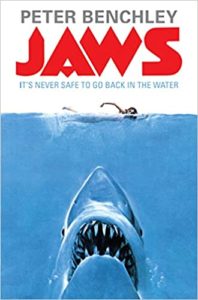Time for a new guest to nominate the five books they want added to my Ultimate Library. Today I am delighted to welcome Chris McVeigh to Grab This Book. Chris is Fahrenheit Press. He runs the show, decides which books they publish and will light up your Twitter feed with his feisty, punkish attitude.
Fahrenheit Press offer noir, thrillers, chillers and even some “spice”. They also do a cracking line in bookish merch. You can visit their website here – http://www.fahrenheit-press.com/ Buy some books and support an indy publisher. If you buy a physical copy of any of their books then Fahrenheit also give you a digital copy to upload to your favourite e-book reader.
What’s the deal with my Ultimate Library? Well for new visitors a quick recap: If a Librarian (me) wanted to fill a brand new Library starting with zero books I wondered which books I should be looking to put on the shelves. I wanted the unmissable, the best, the essential reads. But I knew I could not take on this task alone so I am inviting bookloving guests to help me with this mammoth undertaking – there are two rules which each guest must follow:
Rule 1 – Select Five Books
Rule 2 – They can only select one book per decade over any five consecutive decades
I call this my Decades project. If you are on Twitter search for online conversations using the #Decades hashtag.
Just two rules yet Chris joins previous guest-curator Heather Martin in finding a way to “flex” those rules. I may need to crack down on anthologies in future!
You can visit the Library here: https://grabthisbook.net/?p=5113
Decades
It’s fair to say books have always been a big part of my life.
 Professionally I’ve been involved in the publishing industry for the best part of 30 years but my relationship with books stretches back even further to my weekly visits to the local library when I was a kid. Like a lot of working-class households, we didn’t actually own any books of our own. That doesn’t mean we weren’t well-read though. My ma & da came from a background of the self-taught, politically aware, working class that was such a feature of Glasgow life right through the first half of the 20th century. There was very much an attitude of “we might be poor, but we’re not stupid” – the public libraries in Glasgow were the backbone of that philosophy.
Professionally I’ve been involved in the publishing industry for the best part of 30 years but my relationship with books stretches back even further to my weekly visits to the local library when I was a kid. Like a lot of working-class households, we didn’t actually own any books of our own. That doesn’t mean we weren’t well-read though. My ma & da came from a background of the self-taught, politically aware, working class that was such a feature of Glasgow life right through the first half of the 20th century. There was very much an attitude of “we might be poor, but we’re not stupid” – the public libraries in Glasgow were the backbone of that philosophy.
I started reading voraciously as soon as I was old enough to get my library ticket and I haven’t really stopped since.
The books on this list are the ones that have endured for me through my own 5 decades – though looking at the list I realise I found most of them in my late 20s & early 30s.
Keep The Aspidistra Flying by George Orwell (1936)
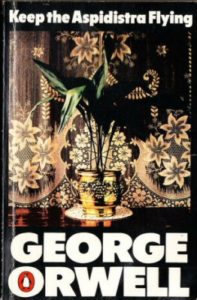 Like most people, I’d been aware of George Orwell from school where Animal Farm and 1984 were on the curriculum. I didn’t come across Keep The Aspidistra Flying though until I’d skipped off to London to seek my fortune and picked I up a battered old 23rd hand copy somewhere on Camden High Street.
Like most people, I’d been aware of George Orwell from school where Animal Farm and 1984 were on the curriculum. I didn’t come across Keep The Aspidistra Flying though until I’d skipped off to London to seek my fortune and picked I up a battered old 23rd hand copy somewhere on Camden High Street.
I was a cocky little shit – thought I was smarter than I was and was certain I was destined for better things. As far as I could see the only thing that kept getting in my way was a total lack of opportunity and the enduring absence of any funds – nothing to do with me poncing about in dive bars all day, talking about becoming a Rockstar – clearly it was all Thatcher’s fault.
The main protagonist of the book is fella called Gordon Comstock and it was his constant tallying and re-tallying of resources – cigarettes left, booze in hand, booze desired, number of days till payday – that first caught my attention because that was basically my life at the time. I’ll be honest though, the finesse and the fierce deep satire which Orwell throws at almost every character in the book was lost on me until I went back and re-read it in my 30s. Since then I’ve gone back to it time and time again and I always find something new to enjoy.
The Glass Bead Game by Herman Hesse (1943)
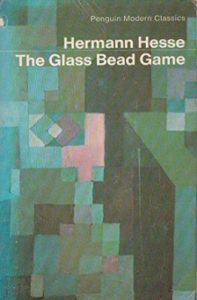 This book, honestly don’t know where to start.
This book, honestly don’t know where to start.
The impact this book has had on my life is frankly ridiculous. I came to it young (too young) when I found a battered copy my hippy older brother had squirrelled away somewhere. It’s probably the book I’ve bought most often – in different editions for myself, or more usually as gifts for the people closest to me – but no matter where I’ve been or what’s happened in my life that very first copy, now battered beyond belief and pretty much spineless, has stayed with me – it’s on the shelf right in front of me now as I’m writing this.
As a precocious 14-year old I didn’t know much more than I liked the cover and the title sounded cool – both those things are still true btw.
The scope of the book is huge and takes in themes ranging from Eastern mysticism, classical music, mathematics, art, power structures, free will, and the challenges faced by individuals when faced with forces of fate that seem so much bigger than any person on their own could hope to overcome.
Obviously at 14 I didn’t have a clue about any of this and I didn’t really get stuck into the meat of the book first time around, it was really just a bedroom prop that made me look a bit smarter and cooler than your average Glasgow Joe (at least that’s what I imagine I thought).
A couple of years later I read an interview with David Bowie where he name-checked The Glass Bead Game, Herman Hesse and the I Ching – that was it – I was hooked – bought myself some yarrow stalks (okay, a box of toothpicks) and set myself up as part-drunk, part-punk & part mystic. Honestly, I really was a precocious little turd back then. Great cheekbones though.
Anyway, point is that once I stopped using the book as a fashion accessory and actually got stuck into it properly in my late 20s/early 30s it genuinely changed my life. It helped me change the way I looked at the world, it helped me celebrate and make peace with the dozens of different selves that were living in my head at that time. This book was only one part of my journey through some very difficult times, but it was an important one and it’s become a talisman for me because of it.
Oh, and it won Herman Hesse the Nobel Prize for Literature in 1946 – so it’s not just me.
Fahrenheit 451 by Ray Bradbury (1953)
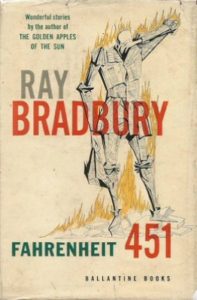 It’d be weird if this wasn’t on my list, right?
It’d be weird if this wasn’t on my list, right?
Only those closest to me know this because I keep it on the down-low but I’m a total Science Fiction geek. Always have been. When I want some time away from the world, you’ll find me slumped on the sofa working my way through a 20-episode binge of Star Trek, Stargate or BattleStar – not to fussy which – as long as it’s got shiny spaceships and lycra uniforms, I’m totally on board.
Fahrenheit 451 wasn’t the sci-fi book that kicked me off on this lifelong secret pleasure (that was probably Asimov’s Foundation series) but it’s the one I keep going back to.
Its importance in my life isn’t all about the book itself though it’s got a lot to do with the way it’s been re-imagined graphically by so many artists over the years. I must have collected 20+ different editions with different covers over the years.
The imagery of 451 Degrees Fahrenheit being the temperature when paper combusts has always fascinated me and when I set up a digital publishing consultancy it seemed like a no-brainer to call it FourFiftyOne – remember these were the days of 2008/9 when many people thought eBooks would replace paper entirely within a decade. Those who go way back with me will remember that my social media handle for the first ten years social media existed was @4fifty1. When I decided to set up a new publishing company back in 2015 it seemed only natural to continue the brand and that’s how Fahrenheit Press came to named.
The book’s not bad either.
A State Of Denmark by Derek Raymond (1964)
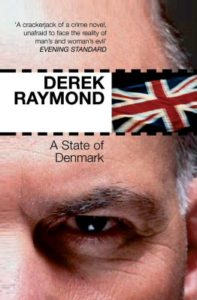 For many people crime writer Derek Raymond is regarded as the founder of British Noir (though mention this in the vicinity of a Ted Lewis fan and they’ll most likely dispose of your body in the trunk of a crushed car). Suffice to say though that if you like your crime fiction gritty you should definitely read Derek Raymond’s Factory Series.
For many people crime writer Derek Raymond is regarded as the founder of British Noir (though mention this in the vicinity of a Ted Lewis fan and they’ll most likely dispose of your body in the trunk of a crushed car). Suffice to say though that if you like your crime fiction gritty you should definitely read Derek Raymond’s Factory Series.
A State Of Denmark though, isn’t part of that series, it was published some twenty years before back in the mid-60s under his original pen-name Robin Cook. Brought back into print by Serpent’s Tail in the mid-80s I first came across it in the early 1990s.
It’s literally a book in 2 parts – the story is split between Italy and the UK – and set in a dystopian near-future where Italy has become a sort of haven for bohemian free-thinkers while back in Britain, Scotland, Ireland & Wales have declared independence and England has sleepwalked itself into a dictatorship where political dissenters are held in internment camps and all non-white immigrants have been deported.
It’s pretty grim stuff in parts to be fair but the writing, particularly about Italy, will raise you up – I first read it on a trip around Sicily and the book and the island have been intertwined for me ever since.
Politics in recent years has thrown this book back into sharp relief and when I re-read it again last year I found it more relevant than ever.
A proper hidden gem which I promise you wont regret hunting out.
The Deptford Trilogy by Robertson Davies (1970-1975)
- Fifth Business
- The Manticore
- World of Wonders
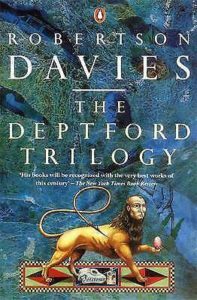 Bit of a cheat this one as it’s really 3 books in 1 but as I first read it in a single-volume I’m going to include it anyway.
Bit of a cheat this one as it’s really 3 books in 1 but as I first read it in a single-volume I’m going to include it anyway.
I didn’t go to university or college, closest I ever got to a qualification was my City & Guilds in Floristry. In almost all the ways that matter, these books were my university.
I was first given a copy of this trilogy in the late 80s by the father of a girlfriend. They were one of those hugely posh, well-off, North London, liberal families. Christ knows what they must have thought when their beloved daughter dragged me back to them – all leather, and make-up, and carrying working-class chips on both shoulders. The romance didn’t last long but against all the odds me and her dad hit it off. He noticed I was smarter than I was pretending to be, and he started lending me a few books he thought I’d like. They weren’t really the sort of books I’d come into contact with before but I’d read them and then we’d chat about them.
The Deptford Trilogy was his ace in the hole – he suggested that whenever I came across a word or anything I didn’t recognise I should go and look it up and see where it took me. There was no internet in the 80s so that meant more trips to the library and that’s exactly what I did. All those years I spent boozing it up in Camden and trying to be a rock-star I was also spending afternoons in the library reading up on Rabelias, Hieronymus Bosch, Bach, Rimbaud and a hundred other subjects that I’d scribbled down in my notebooks while reading The Deptford Trilogy (and subsequently the other two trilogies in the series). Every time I came across anything I didn’t know I looked it up and each time I did my knowledge spread like a spider’s web. The internet definitely makes research quicker, but I’m really pleased it didn’t exist back then because every single book I read sank deep into my brain, it was an effort to find out the stuff I wanted to know and it lodged inside. The whole process set a habit that became a pattern ever since and to this day I still don’t really trust anyone who never asks questions or pretends they know everything.
This probably makes these books by Roberston Davies sound worthy and dry – I promise they’re anything but, the storytelling is better than almost anything else I’ve ever read, they’re funny and joyful and mischievous and wise. I’m always constantly surprised that he isn’t more well known than he is. If you haven’t read them you’re in for a real treat.
Okay, that’s my 5 books from 5 decades, thanks to Gordon for asking me to take part in this – such a belting idea – I’ve really enjoyed the whole thing.
I am extremely grateful to Chris for giving up some of his time to share his selections. He did suggest a bottle of bourbon may be needed to help him remove some of his favourite books from his final five, I hope the decicion making process wasn’t too traumatic.
Decades Will Return
